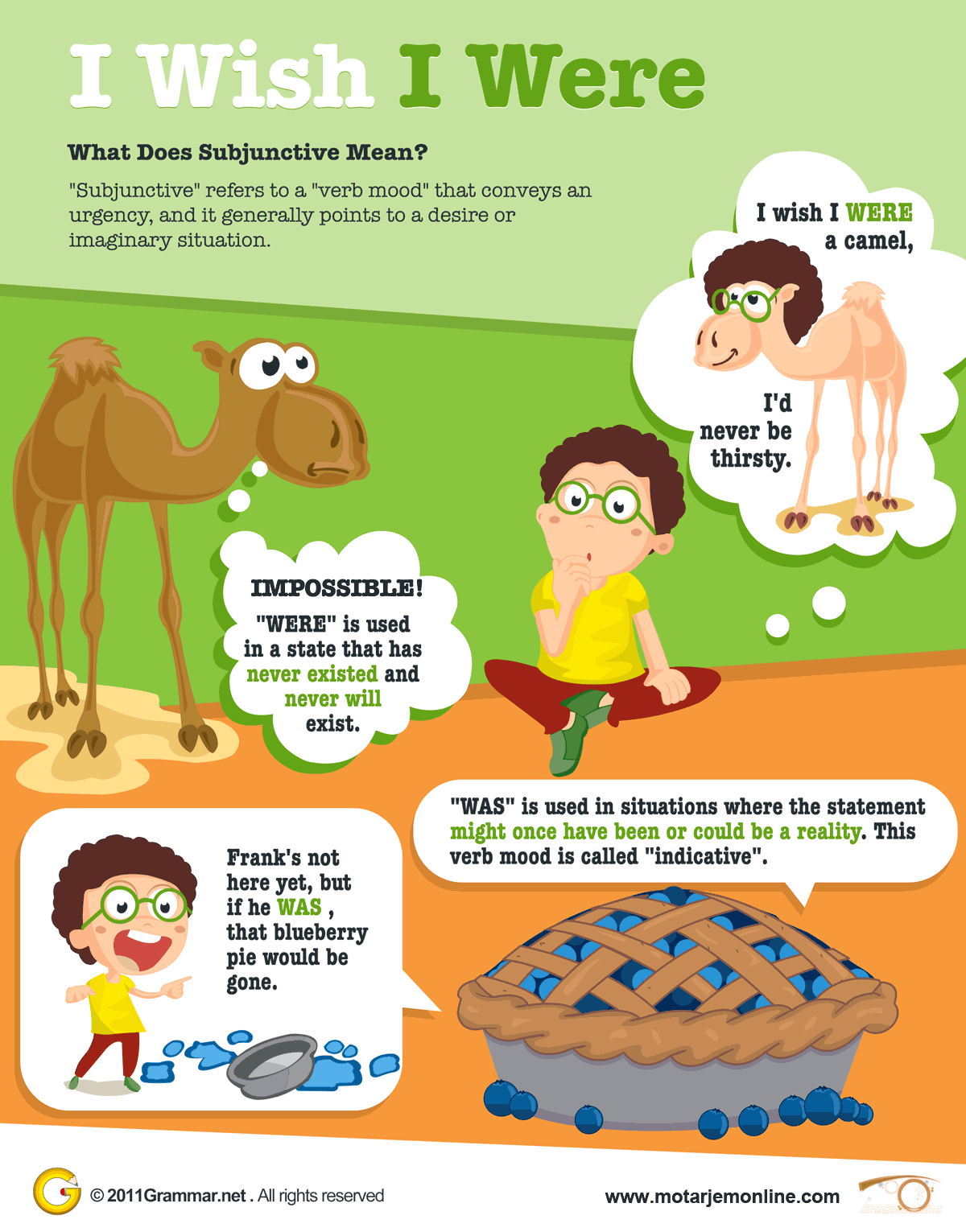I wish I were...l
“I wish I were” and “I wish I was”: which of these is proper in English? Both are proper, they are not interchangeable, and each has a purpose. Luckily, the differences are simple.
What Does “Subjunctive” Mean?
“Subjunctive” refers to a “verb mood” that conveys an urgency, and it generally points to a desire or imaginary situation. This mood is most noticeable in the third person. In subjunctive form, the simplest root of the word is used.
“It is necessary that each farmer water his field and milk his cows.”
“The chickens requested that the fox be removed.”
These sentences illustrate an urgency, and the latter goes further with a prompt–please remove that fox so those poor chickens will not be eaten.

Before the fourteenth century, the subjunctive forms of verbs in English were well used, but most have faded out from modern English almost completely. To fill this niche, speakers generally rely on forms of “would” and “could”, but in the few instances where the subjunctive can still be found, its use is quite simple to learn.
In an old television commercial, a small boy sings, “I wish I were” a hot dog; this commercial actually does follow the old subjunctive rules. “Were” is used in a state that has never existed and never will exist. The child in the commercial lived out a fairly normal life and never became a hot dog.
“I wish I were a camel; I’d never be thirsty.”
“When it rains this hard, people often wish they were ducks.”
“If I were a hot dog, I would probably wish I were a little boy.”
If I Was, If It Was
The lines are smudged in everyday speech, and this is the phrase most likely to be used, but it is only correct in certain references. “Was” is used in situations where the statement might once have been or could be a reality. This verb mood is called “indicative”. These subtle differences once enabled a speaker to “indicate” something without using more words to spell it out.
“If I was home, I would be sitting on the couch eating chips.”
The speaker indicates with subtlety that he intends to go home, and potato chips will be involved.
“Frank’s not here yet, but if he was, that blueberry pie would be gone.”
Because “was” is used, even if it read, “If Frank was here, that pie would be gone,” readers can assume that Frank will show up eventually, and the pie is in danger.
In an unknown situation, it is admissible to use “was”.
“If Betty was smart, she’d go hide that pie.”
Even if there is proof that Betty is NOT smart, it is certainly more polite to indicate she might be!
“If it was Friday, I don’t blame her for taking a short lunch.”
“Was” is intended to emphasize “Friday” and that it was a fact.
“I wish I were” and “I wish I was”: which of these is proper in English? Both are proper, they are not interchangeable, and each has a purpose. Luckily, the differences are simple.
What Does “Subjunctive” Mean?
“Subjunctive” refers to a “verb mood” that conveys an urgency, and it generally points to a desire or imaginary situation. This mood is most noticeable in the third person. In subjunctive form, the simplest root of the word is used.
“It is necessary that each farmer water his field and milk his cows.”
“The chickens requested that the fox be removed.”
These sentences illustrate an urgency, and the latter goes further with a prompt–please remove that fox so those poor chickens will not be eaten.

Before the fourteenth century, the subjunctive forms of verbs in English were well used, but most have faded out from modern English almost completely. To fill this niche, speakers generally rely on forms of “would” and “could”, but in the few instances where the subjunctive can still be found, its use is quite simple to learn.
In an old television commercial, a small boy sings, “I wish I were” a hot dog; this commercial actually does follow the old subjunctive rules. “Were” is used in a state that has never existed and never will exist. The child in the commercial lived out a fairly normal life and never became a hot dog.
“I wish I were a camel; I’d never be thirsty.”
“When it rains this hard, people often wish they were ducks.”
“If I were a hot dog, I would probably wish I were a little boy.”
If I Was, If It Was
The lines are smudged in everyday speech, and this is the phrase most likely to be used, but it is only correct in certain references. “Was” is used in situations where the statement might once have been or could be a reality. This verb mood is called “indicative”. These subtle differences once enabled a speaker to “indicate” something without using more words to spell it out.
“If I was home, I would be sitting on the couch eating chips.”
The speaker indicates with subtlety that he intends to go home, and potato chips will be involved.
“Frank’s not here yet, but if he was, that blueberry pie would be gone.”
Because “was” is used, even if it read, “If Frank was here, that pie would be gone,” readers can assume that Frank will show up eventually, and the pie is in danger.
In an unknown situation, it is admissible to use “was”.
“If Betty was smart, she’d go hide that pie.”
Even if there is proof that Betty is NOT smart, it is certainly more polite to indicate she might be!
“If it was Friday, I don’t blame her for taking a short lunch.”
“Was” is intended to emphasize “Friday” and that it was a fact.

